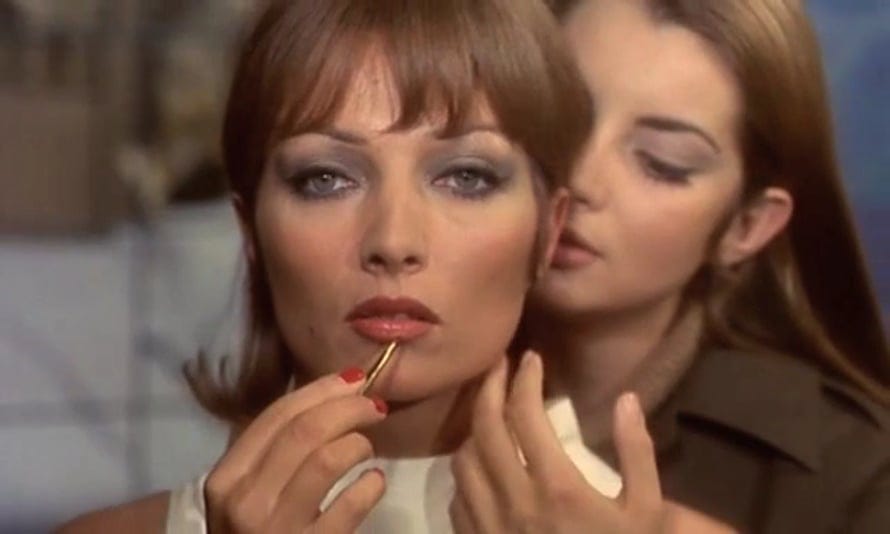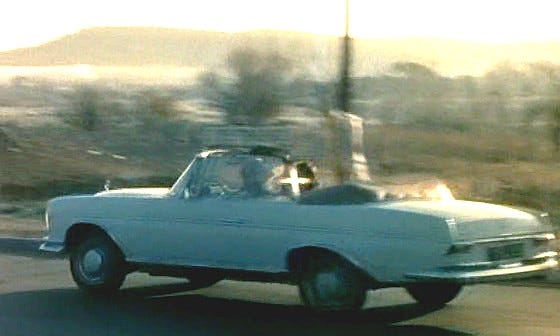And so we come to Les Biches (1968), Claude Chabrol's erotic psychological thriller, starring She-Who-Can-Do-No-Wrong Stéphane Audran; Sixties Sensation, Jacqueline Sassard and the Thinking Girl's Crumpet, Jean-Louis Trintignant. I'm an admirer of the Chabrol/Audran combo, which we visited last year in La Femme Infidèle (1969). Audran, famously, had been married to Chabrol for sixteen years (they divorced in 1980), altho' I had forgotten that Audran had also been married to Jean-Louis Trintignant. In Les Biches, he plays a sort of smooth, indifferent thirty-something architect with a natty line in knitwear. Quite a love triangle.
Commentators have noted the various parallels with Patricia Highsmith’s The Talented Mr. Ripley (1955), which there are, up to a point Lord Copper: I suppose the Jacqueline Sassard character might be Tom Ripley, and Stéphane Audran, at a pinch, Dickie Greenleaf — but then, Jean-Louis Trintignant ain’t exactly Marge Sherwood and the 1960s Saint-Tropez jet-set location is a very different kettle of Bouillabaisse from Mongibello and the Amalfi Coast of the 1950s.
But we're certainly in manipulative psychological territory, offset by Chabrol's elegant and poised direction (oh, that Palace Script font in the titles! Like an invitation to a smart cocktail party) and — right from the very beginning — there’s Pierre Jansen's menacing, unsettling soundtrack. Sexy, predatory Frédérique (Stéphane Audran) picks up denimed, transient beauty, Why (Jacqueline Sassard), on the Pont des Arts in Paris — like a bauble at the Porte de Clignancourt Flea Market; a sapphic plaything. Frédérique's one of those immaculate, savvy and sophisticated older woman types. Like a Françoise Sagan character perhaps? Like Ann in Bonjour Tristesse (1954), without the morality? From her YSL belt to her white Mercedes-Benz drophead and her Cartier cigarettes. I'm not sure what she does if she does anything at all, but if she did work, she might be an interior designer — i.e. she's worldly, idle and rich. Which helps. Anyway, Frédérique gets the serious hots for Why, which is kinda understandable, as she's gorgeous — but, at the same time, the girl's also seriously spaced out and most definitely ambiguous, like a drugged nymph; it's never entirely clear if she prefers women to men, or vice versa, or perhaps she's not really interested in either, hence her name. Jacqueline Sassard does seem to be cast in these roles. Remember her lobotomised “How d'y say” Anna von Glatz und Loden in Joseph Losey's Accident (1967)? The undergraduette? The girl Dirk tries to seduce in a coppice in the countryside, just outside Oxford? To the sound of distant bells? And fails miserably.
Anyway. Les Biches (1968). It’s all delightfully French, and very grown up. The girls then drive down in the white Mercedes to Frédérique’s villa in Saint-Tropez. A villa which looks like a white — Frédérique’s keen on white — Spanish ranch, decorated with artefacts from the Portuguese colony of Mozambique, the stuff of tribal nightmares — and it’s also inhabited by two irritating and tiresome spongers. A pair of slapstick comedians, wannabe avant-garde artistes with Marxist aspirations. Like a pair of wise-cracking Jacques Tatis gone wrong. And there’s a butler and a cook.
I can't think of a nicer place in which to be than Saint-Tropez. But in 1968. In the winter, with a sparkling blue-grey sea, Scots Pines, VéloSolexes, old men playing boules in a pollarded town square, bargains in the local market. Backlit paradise: with lens flare. This, of course, was the former Saint-Tropez, before the caravan and camping sites, the holiday traffic jams, the building sites and luxury redevelopment, the gigantic motor yachts of the super-rich, the package holidays of the super impecunious — and all that comes with both. I prefer my French resorts out of season, like the understated, fag-end-of-summer Antibes of Graham Greene's May We Borrow Your Husband And Other Comedies of Sexual Life ? (1967), the fading, wedding-cake splendour of the grand old hotels of the Normandy coast (very Fleming), or further afield, the wintry Venice of Don't Look Now (1973): a tale of formica and fugged up, steamy stand-up bars, and green marbled halls in four-star hotels.
Keep reading with a 7-day free trial
Subscribe to Luke Honey's WEEKEND FLICKS. to keep reading this post and get 7 days of free access to the full post archives.






